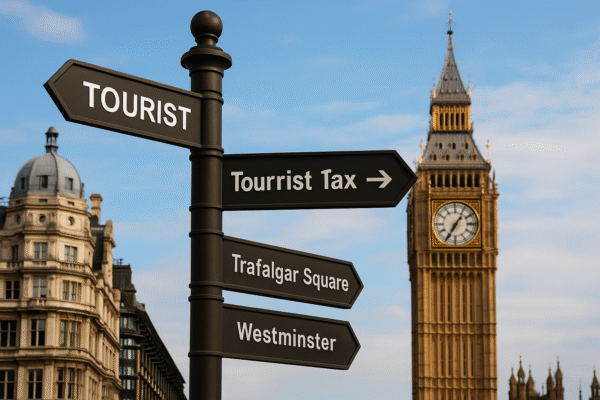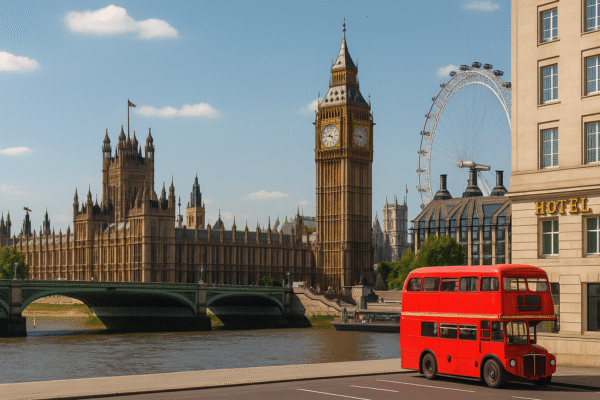London is at the centre of a growing debate over the introduction of a tourist tax, a move that could transform how the UK funds public services and supports its booming travel industry.
With the nation facing a widening fiscal deficit and few options to cut spending without harming essential services, policymakers are exploring ways to boost revenue. One proposal gaining momentum is a hotel levy for visitors staying in London. Supporters say it’s a practical, low-impact solution that asks tourists to contribute to the upkeep of the city they enjoy, while helping relieve financial pressure on residents.
Why London is the Focus
London attracts over 43 million visitors annually, more than half of all international arrivals to the UK. These tourists bring in an estimated £33.7 billion each year, supporting thousands of jobs in hospitality, transport, and retail. Despite this, London remains one of the few major tourist destinations worldwide without a dedicated hotel tax.
Cities like Paris, Barcelona, and New York have long charged visitors a small nightly fee, with the funds reinvested into infrastructure, cultural attractions, and local services. The absence of a similar system in London means that residents shoulder much of the cost of maintaining public spaces, transport networks, and visitor facilities.
How the Tax Could Work
Advocates suggest introducing a nightly charge—potentially around £12—for visitors staying in hotels, serviced apartments, or short-term rentals. Estimates suggest this could generate up to £500 million annually. These funds could be earmarked for public services strained by high visitor numbers, such as waste collection, transport, policing, and park maintenance.
The levy could also be used to enhance the tourism experience—supporting events, upgrading signage, and preserving landmarks. A percentage of the funds might be allocated to cultural projects, ensuring attractions remain world-class and accessible.
Impact on Visitors
Studies show that modest hotel levies have little to no effect on overall visitor numbers in comparable destinations. Given London’s global appeal—home to icons like Buckingham Palace, the Tower of London, and the British Museum—a small nightly charge is unlikely to deter travellers.
Even after adding a tax, London’s average hotel rates would remain competitive with other major cities. For most international tourists, the additional cost would be a small fraction of their total holiday budget.
Concerns from the Hospitality Industry
Some hoteliers and industry groups worry that any extra cost could impact competitiveness, particularly for budget-conscious travellers. The sector is still recovering from the pandemic, and operators are cautious about policies that might affect occupancy rates.
However, cities such as Manchester and Liverpool have already introduced similar levies without significant drops in bookings. Manchester’s City Visitor Charge, for example, funds tourism development projects and has been received positively by both visitors and locals.
Economic and Social Benefits
A London tourist tax could deliver tangible benefits beyond revenue. By directly funding the services that visitors use, it would help reduce the strain on local infrastructure. Public transport improvements, cleaner streets, and well-maintained parks would enhance the city for both residents and tourists.
There’s also a fairness argument. Tourists enjoy London’s amenities and contribute to its wear and tear. Asking them to make a small contribution is seen by many as reasonable—especially when the funds are transparently reinvested into the city.
Balancing Local and National Needs
While London is the primary focus, a flexible model could allow other high-traffic destinations to adopt their own tourist levies if desired. Smaller towns and rural areas could choose whether to opt in based on their tourism capacity and infrastructure needs.
The policy could also be designed to target high-value travellers more than budget visitors, minimising the impact on affordability. This might include exemptions for certain groups, such as students or those visiting for medical reasons.
Global Best Practices
Learning from other cities will be key. In Barcelona, revenue from its tourist tax funds beach cleaning, cultural heritage preservation, and environmental projects. In New York, the levy supports city marketing campaigns and event funding. London could adopt a hybrid approach, using the funds for both local improvements and broader tourism promotion.
Looking Ahead
If introduced, the tourist tax could be part of a broader strategy to make London’s tourism more sustainable. Coupled with policies promoting eco-friendly travel, off-peak visits, and community-based tourism, it could help balance economic benefits with quality of life for residents.
As the autumn budget approaches, the proposal is expected to feature prominently in discussions. While it may not solve the UK’s entire fiscal challenge, it represents a meaningful step towards financial stability—one that leverages London’s global status to support its future.
For more travel news like this, keep reading Global Travel Wire


















